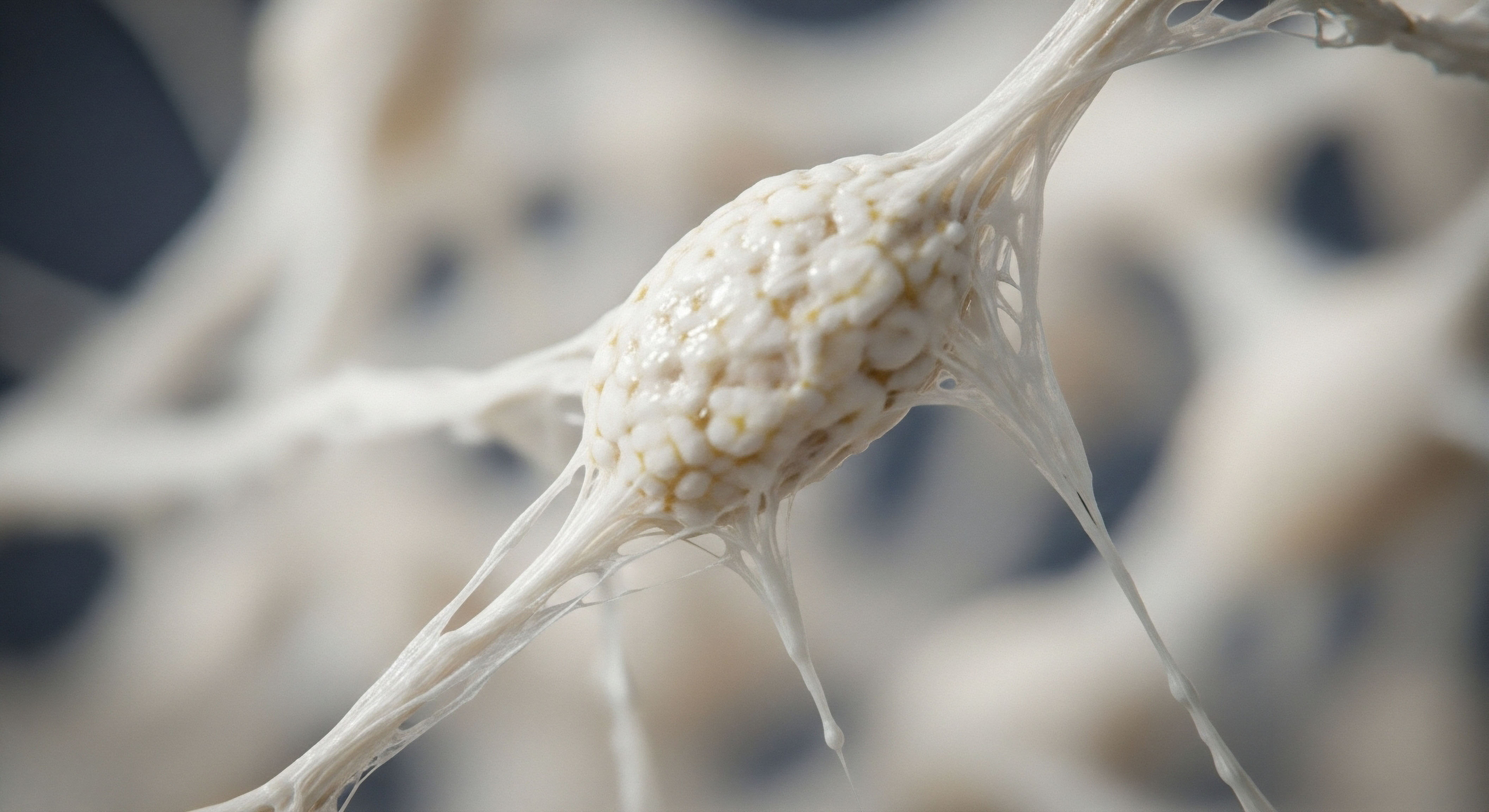

The Brain-Body Nexus ∞ Unlocking Cognitive Command
Your mind is not a separate entity from your muscle. Cognitive resilience, that sharp, unwavering mental acuity, stands as a direct output of physical command. The conventional separation of mental and physical health dissolves under scientific scrutiny. Aging brings challenges, yet these are not inevitable surrender points. Instead, they represent opportunities for proactive engagement. The intricate dance between physical activity and cognitive decline reveals a powerful truth ∞ your physical might directly shapes your mental landscape.
The brain, a dynamic organ, thrives on the signals generated by movement and exertion. Physical activity, especially resistance training, initiates a cascade of biological events within the body. These internal processes directly support and enhance brain function. This connection offers a compelling pathway for maintaining peak mental performance throughout life.

Muscular Signals for Neural Growth
Physical exertion acts as a potent catalyst for neurotrophic factors. One such critical molecule is brain-derived neurotrophic factor (BDNF), often called “Miracle-Gro for the brain.” Robust physical engagement significantly elevates BDNF levels, fostering neuroplasticity and supporting the growth of new neurons. This crucial protein facilitates the creation of new synaptic connections, strengthening existing neural pathways.
Systemic hormonal responses further reinforce this brain-body alliance. Intense physical training modulates levels of insulin-like growth factor 1 (IGF-1) and other growth hormones. These powerful biochemical messengers travel to the brain, influencing neurogenesis and protecting existing neural structures. Such endocrine recalibration plays a profound role in maintaining a youthful cognitive profile.
Research indicates that resistance training yields the most significant improvements in brain-derived neurotrophic factor (BDNF) levels compared to other exercise modalities, directly impacting brain health.

Metabolic Health, Mental Clarity
Maintaining muscle mass translates into superior metabolic health. Reduced inflammation and oxidative stress, common adversaries of cognitive function, become tangible benefits of a physically active lifestyle. Strong musculature provides a metabolic reservoir, regulating blood sugar and insulin sensitivity. These systemic improvements create an optimal environment for sustained mental clarity and processing speed.
Consider the brain as a highly adaptable, complex system. It responds to challenge and stimulus with remarkable capacity for growth and reorganization. Physical conditioning delivers that essential stimulus, translating into tangible gains in memory, executive function, and overall cognitive robustness. The connection between physical might and intellectual sharpness is a profound biological truth.


Physical Protocols ∞ Sculpting Mental Fortitude
Leveraging physical might for cognitive gain demands a strategic, informed approach. It extends beyond casual movement, requiring targeted protocols designed to elicit specific physiological adaptations. These methods optimize the internal environment, setting the stage for superior brain performance. Intentional physical practice becomes a direct investment in your mental future.
Diverse forms of physical activity offer distinct advantages for enhancing cognitive function. Resistance training, high-intensity interval training (HIIT), and even focused balance and coordination work each contribute unique benefits. The goal involves stimulating a comprehensive range of biological responses. This multi-modal strategy maximizes neural support and cognitive resilience.

Resistance Training for Brain Power
Strength training stands as a cornerstone for cognitive optimization. It directly impacts brain health by stimulating the release of myokines, muscle-derived signaling molecules, which cross the blood-brain barrier. These molecules, including irisin and BDNF, promote neurogenesis and enhance synaptic plasticity. Three resistance-training workouts per week can improve cognition and boost memory performance.
Progressive overload, a fundamental principle of strength training, is crucial. Consistently challenging muscles with increasing resistance signals the body for adaptation and growth. This systemic demand extends its benefits to the brain, fostering a resilient, adaptable cognitive architecture. The disciplined pursuit of physical strength directly translates into mental acuity.
Key principles for designing a cognitive-enhancing physical regimen:
- Compound Movements ∞ Prioritize exercises engaging multiple muscle groups simultaneously, like squats, deadlifts, and presses. These movements elicit significant hormonal responses.
- Progressive Overload ∞ Gradually increase resistance, repetitions, or training volume over time. This continuous challenge stimulates adaptation across all physiological systems.
- Consistent Practice ∞ Regularity supersedes sporadic intensity. Adherence to a consistent schedule yields cumulative benefits for both body and brain.
- Variety in Stimulus ∞ Incorporate diverse training modalities. Blend resistance training with aerobic intervals and activities demanding coordination.
A meta-analysis of various exercise types ranked resistance training as having the most significant effect on improving BDNF levels, essential for brain health.

High-Intensity Intervals and Neural Pathways
High-intensity interval training (HIIT) provides another potent stimulus for cognitive enhancement. Short bursts of maximal effort followed by brief recovery periods elevate heart rate and metabolic demand. This training style improves cardiovascular health, which directly supports cerebral blood flow. Enhanced blood flow delivers vital oxygen and nutrients to brain tissue, optimizing its function.
Balance and coordination exercises, often overlooked, offer direct neural benefits. Activities like yoga, tai chi, or specific movement drills challenge proprioception and spatial awareness. These practices activate diverse brain regions, enhancing neural connectivity and improving motor planning. Such specialized training refines the intricate communication networks within the brain.


The Lifespan Edge ∞ Sustained Vitality Trajectories
The optimal time to begin fortifying your cognitive defenses through physical might is always now. While earlier intervention offers a longer runway for compounding benefits, the brain’s remarkable plasticity means adaptation remains possible at any age. This proactive stance redefines aging, transforming it from a process of passive decline into an active trajectory of sustained vitality. A commitment to physical excellence is a commitment to a sharper, more vibrant future self.
Adopting a lifelong optimization protocol stands as a strategic imperative. The cumulative effect of consistent physical activity over decades profoundly shapes cognitive outcomes. This enduring commitment builds a robust physiological reserve, buffering the brain against age-related stressors. Investing in physical strength today secures a richer cognitive experience tomorrow.

The Compounding Returns of Movement
Consistent physical engagement delivers compounding returns for brain health. Each workout contributes to a deeper, more resilient foundation. Studies demonstrate a clear association between regular physical activity and a reduced risk of cognitive decline. Even modest amounts of moderate-to-vigorous activity yield substantial protective effects.
Expect noticeable changes across both physical and cognitive domains. Improved strength and endurance manifest relatively quickly. Cognitive enhancements, while sometimes more subtle initially, accrue steadily. Enhanced focus, quicker processing speed, and improved memory recall become increasingly apparent with sustained effort. The brain adapts, grows, and strengthens in response to consistent, challenging physical input.
Engaging in as little as 35 minutes of moderate to vigorous physical activity per week reduces dementia risk by 41%, with greater activity yielding further reductions, up to 69% for 140 minutes or more weekly.

Mastering the Aging Process
This approach empowers individuals to take decisive control of their aging process. It moves beyond simply managing symptoms, focusing instead on optimizing biological systems. The pursuit of physical might becomes a powerful tool for self-mastery, enabling a sustained, high-performance life. This journey represents a profound commitment to self-actualization and enduring vitality.
The timeline for benefits spans a lifetime. Initial gains build momentum, leading to sustained improvements in both physical and mental performance. This ongoing journey ensures a future where mental sharpness remains a personal hallmark. Your biological destiny is shaped by these deliberate, powerful choices.

Beyond Decline ∞ Mastering Your Biological Destiny
The notion of an inevitable cognitive decline with age represents an outdated perspective. Modern science reveals a profound, undeniable link between physical might and mental acuity. Our bodies and brains are inextricably linked, forming a single, high-performance system. Embracing this truth empowers us to actively sculpt our cognitive future. This is not about merely slowing a decline; it involves actively building a more resilient, sharper mind.
The path to enduring mental vitality runs directly through consistent, intelligent physical training. This proactive engagement unlocks a cascade of benefits, from enhanced neurogenesis to optimized hormonal balance. We possess the tools to defy conventional aging narratives. The future of peak human performance resides in this integrated understanding of self. We stand at the precipice of a new era, where biological destiny is a matter of informed choice and determined action.



